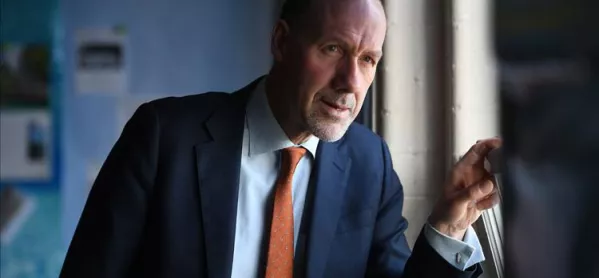- Home
- ‘Reasons to be cheerful about education’
‘Reasons to be cheerful about education’

The writer Matt Ridley talks of “fashionable pessimism” - the rather-too-easy assumption that things in the modern world are hurtling towards hell in the proverbial handcart, the view that life in our recent or distant past was somehow better than today.
But, as Ridley reminds us in his book The Rational Optimist, we must beware lazy nostalgia.“It is easier,” he says, “to wax elegiac for the life of a peasant when you do not have to use a long-drop toilet.”
Last Friday, I was in York addressing a group of Year 13 students on their last day of school, before they embark on the next phase of their lives. I was determined to avoid any misty-eyed guff about my own past or fashionable pessimism about the world as it is today.
Instead, I dished up some reasons to be cheerful. And as readers over a certain age will understand, this meant I inevitably made reference to that quirky ‘80s icon Ian Dury and his band, the Blockheads.
A victim of childhood polio, a condition also known as infantile paralysis, Dury would swap his walking-sticks for a microphone, grasp it tight for physical support, look us all in the eye, then belt out lyrics about the joy of being alive.
The juice of a carrot, the smile of a parrot
A little drop of claret, anything that rocks
Elvis and Scotty, the days when I ain’t spotty
Sitting on a potty, curing smallpox
He celebrated the capacity of human beings to savour the small stuff (not being spotty) and tackle the big stuff (finding the cure for smallpox).
It was akin to what that supreme optimist Barack Obama would later say:
“If you had to choose one moment in history in which you could be born, and you didn’t know ahead of time who you were going to be - what nationality, what gender, what race, whether you’d be rich or poor, gay or straight, what faith you’d be born into - you wouldn’t choose 100 years ago. You wouldn’t choose the fifties, or the sixties, or the seventies. You’d choose right now.”
And, of course, in education we have one of the most optimistic roles possible because we are the custodians of young people’s futures.
Except that too often it doesn’t feel like that. It can seem not just that we are in a phase of fashionable pessimism, but that all the big issues we face - funding, recruitment, retention, workload, mental health - are deep-rooted, intractable, just plain terrible.
That’s certainly how many school leaders will have felt if they read this week’s report from the Commons Public Accounts Committee on converting schools to academies. Here’s a flavour of its conclusions (spoiler: there’s no optimism here):
- In the rush to convert large numbers of schools to academies, the Department for Education did not pay enough attention to ensuring that its scrutiny of applicants was sufficiently rigorous;
- Some schools that are required to or want to become academies find it difficult to attract potential sponsors or find multi-academy trusts to join;
- The DfE’s arrangements for oversight of schools are fragmented and incoherent, leading to inefficiency for government and confusion for schools.
There’s no doubt that the turbulence of so much fast-paced reform has resulted not only in high-profile failures but also in the sense of a fragmented system. School and college leaders know how confusingly complex and burdensome this feels.
‘Bringing an atomised education system together’
But - speaking as someone who was so deeply critical of the concept of enforced academisation - I also regularly meet leaders working their guts out to bring coherence to all this, driven by moral purpose and a determination to restore hope to communities.
For example, I see heads and principals stepping into executive leadership. They see it is a way to use their experience to support and coach new leaders - something that wasn’t always there when some of us stepped into headship. Suddenly, in those lonely first months of headship, there’s someone there to help; a case of one generation passing on their insights and expertise to the next, of us creating the future leaders our children will need.
I also speak to members of leadership teams who see multi-academy trusts as a way of doing what our education system hasn’t always done well - ensure that a child’s experience and opportunities in one school are matched in all the others within their organisation. The best leaders are joining schools together in a bid to build more consistent opportunities, more access to excellence.
And I see the best teaching school alliances creating a culture of professional development that places partnership working and collaboration - rather than competition - at their core. I see pedagogical inquiry, evidence-based research, and a desire to reaffirm teaching as a great profession.
Yes, we also hear of MATs where things go wrong. But we need to be careful that the discourse about academies doesn’t become corrosive, and that good people working hard aren’t caricatured and stigmatised, dismissed as part of the problem when they are really part of the solution. Whatever your viewpoint on academisation - and opinion continues to be sharply and often loudly divided - we are where we are. The challenge is to take a system which is atomised and rebuild a sense of how we make it work.
As we head towards the summer break, it is perhaps a good time to focus on the future rather than the past. What we need is some fashionable optimism.
Geoff Barton is general secretary of the Association of School and College Leaders
Keep reading for just £1 per month
You've reached your limit of free articles this month. Subscribe for £1 per month for three months and get:
- Unlimited access to all Tes magazine content
- Exclusive subscriber-only stories
- Award-winning email newsletters



